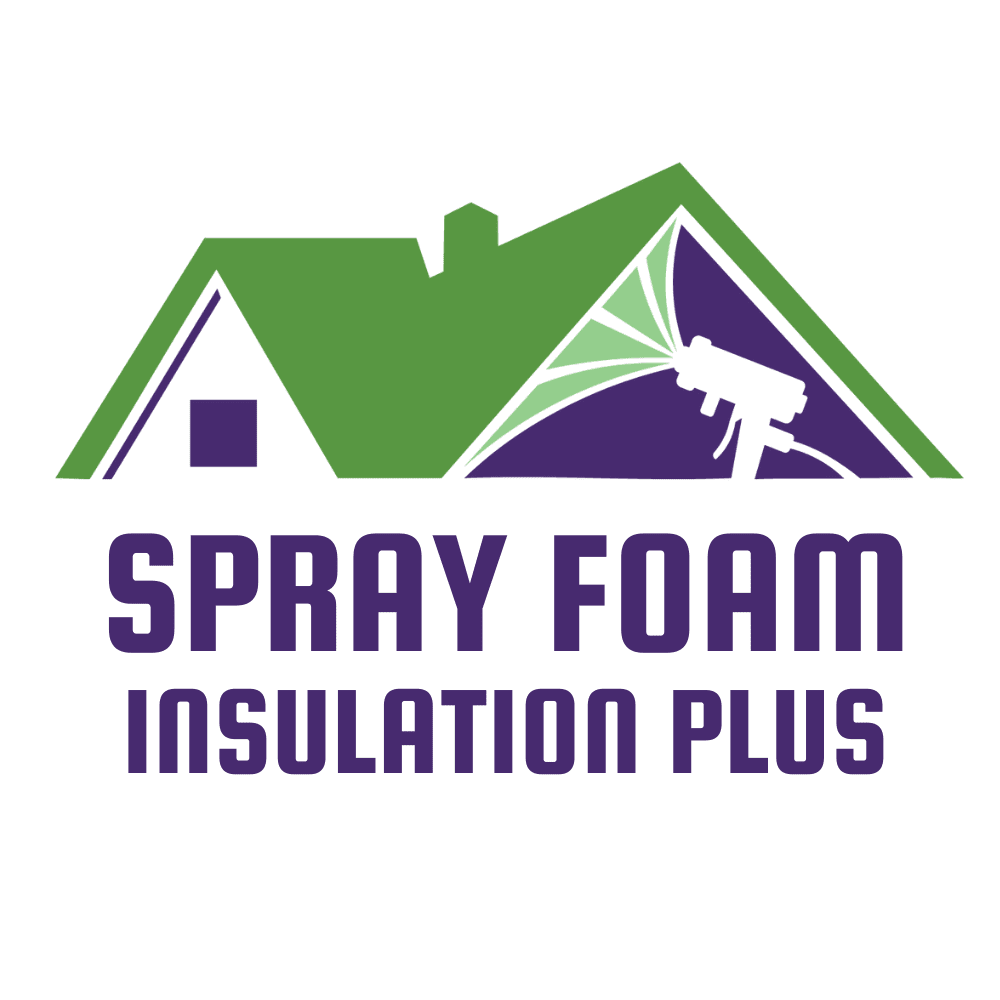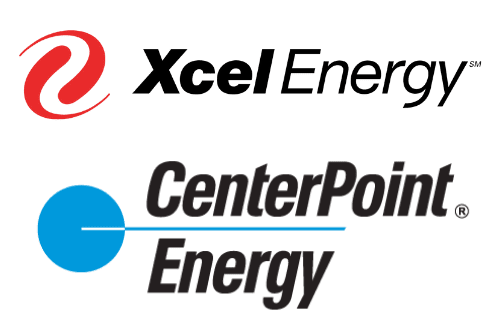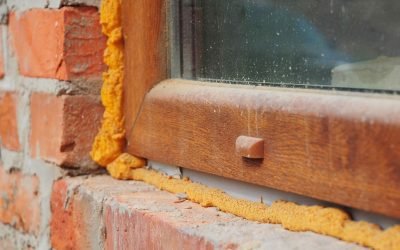Spray Foam Insulation for Commercial Buildings

Last Updated on June 30, 2024 by Spray Foam Insulation Plus
Indeed, spray foam insulation for commercial buildings unlocks significant energy savings. It works effectively by trapping heat within the structure during chilly seasons and keeping it out when it’s warm – this leads to reduced costs for heating or cooling. But that’s not all; spray foam insulation, thanks to its unique expansive nature, fills up every nook and cranny, ensuring an airtight seal that traditional insulation materials sometimes miss. Ready for a surprising twist? This tight seal also minimizes noise transmission – a bonus many hadn’t reckoned on! Now let’s talk about what this exactly is.
Spray foam insulation for commercial buildings offers several key benefits, including superior air sealing properties, energy efficiency, improved indoor air quality, moisture resistance, and long-term cost savings. Additionally, it provides enhanced structural integrity and can contribute to creating a more comfortable and sustainable environment within commercial spaces.
What is Spray Foam Insulation?
Spray foam insulation is like magic—well, science-based magic, that is. It begins as a liquid mixture of isocyanate and polyol resin, two materials that, when combined, create an expanding foam. When this liquid is sprayed onto a surface, it quickly expands, filling every nook and cranny, effectively sealing gaps and forming a powerful insulating barrier. This ability to expand and fill spaces makes it ideal for thoroughly insulating areas within commercial buildings.
Not only does it have this remarkable expansion capability, but once it hardens, it becomes a durable, long-lasting solution for insulation. It’s like having an impenetrable shield against heat loss or gain.
How It Works
Polyurethane spray foam insulation has become widely popular in the construction industry due to its extraordinary insulation properties, efficiency, and flexible application. The foam’s fine cellular structure creates millions of tiny air pockets that slow down the transfer of heat, making it an outstanding thermal insulator. It also serves as both an air barrier and a vapor retarder, reducing the risks of mold and mildew growth significantly.
Its Versatility
When correctly applied to areas such as walls, roofs, attics, and crawl spaces in commercial buildings, spray foam insulation provides a complete seal against drafts and air leaks. Unlike any other type of insulation material, it adapts to any shape and size, ensuring a perfect fit.
The unique composition of spray foam insulation sets it apart from traditional fiberglass batts or cellulose insulation. It can easily fill irregular cavities without leaving gaps or compromising the building’s envelope integrity.
An interesting aspect of spray foam insulation is its ability to serve as both an insulator and an air sealant simultaneously
This dual functionality helps enhance indoor comfort by maintaining consistent temperatures throughout the building while reducing energy consumption by preventing heat transfer through walls and roofs.
With these key features combined, spray foam insulation delivers efficient R-values that outperform conventional insulating materials—contributing to energy cost savings in the long run.
In essence, spray foam insulation offers a comprehensive solution for commercial buildings seeking sustainable energy efficiency with minimal maintenance needs for years to come.
Moving beyond the basics of spray foam insulation’s benefits for commercial buildings, let’s delve into how two unique forms of this material compare.
Call us today at 612-730-9417 to discuss your commercial installation project or request an installation quote at our Contact Us page.
Two Component vs. Closed-Cell Foam Comparison
When it comes to insulating commercial buildings, selecting the right type of spray foam is crucial for maximizing energy efficiency and cost-effective savings. Two-component spray foam and closed-cell spray foam are two popular choices, each with unique properties and benefits tailored to specific insulation needs.
Two-Component Spray Foam
Two-component spray foam is known for its versatility, consisting of separate A and B components (resin and catalyst) that are mixed during application. This type is commonly used in various commercial insulation projects due to its ability to adapt to different surfaces and cavity sizes, achieving a customized fit that effectively seals gaps, penetrations, and irregular surfaces. The flexibility and adaptability make it an excellent choice for handling complex architectural features and irregular building structures, providing seamless coverage and enhanced energy efficiency.
Closed-Cell Spray Foam
Closed-cell spray foam is a denser and more rigid option that provides superior insulating properties. Its greater R-value per inch makes it an ideal choice for commercial buildings where space may be limited, but high insulation performance is required. The strong, dense structure allows it to provide outstanding thermal resistance, effectively preventing heat transfer through walls, roofs, and other building components. This feature not only supports energy efficiency but also contributes to substantial cost savings by reducing heating and cooling loads on HVAC systems, thereby lowering utility expenses in the long run.
For instance, a building with limited wall or roof space can benefit significantly from closed-cell spray foam due to its high R-value per inch, allowing for maximum thermal performance within a confined area.
The comparison between these two types of spray foam highlights the importance of selecting the right option based on the specific requirements of a commercial building project. While two-component spray foam offers flexibility and adaptability for diverse applications, closed-cell spray foam excels in delivering top-tier insulation performance within limited spaces.
The next step is to consider how these qualities align with the unique needs and goals of your commercial building project. This will ensure that you make an informed decision that optimizes energy efficiency and long-term cost-effectiveness.
With a firm understanding of the insulating properties of two-component and closed-cell spray foams, we are now poised to explore their impact on air quality and energy efficiency in commercial settings—an essential aspect of creating a healthy indoor environment while minimizing operational costs.
Impact on Air Quality and Energy Efficiency
When it comes to a commercial building, indoor air quality is crucial. It’s not just about the temperature; breathing in clean air is just as important. With spray foam insulation forming an airtight seal, it effectively prevents outside air, moisture, and pollutants from entering the building. This significantly impacts indoor air quality—by reducing the infiltration of allergens and pollutants, it creates a clean and healthy environment for everyone inside.
You might not think about it often, but poor indoor air quality can cause headaches, dizziness, and fatigue. By keeping impurities out and allowing for controlled ventilation, you’re ensuring the well-being and productivity of everyone inside.
Now, let’s discuss energy efficiency. Heating and cooling a large commercial building can be quite costly. Spray foam insulation’s airtight seal plays a significant role in improving energy efficiency, making it easier for the building to maintain a consistent internal temperature with minimal energy loss.
Less energy loss means lower heating and cooling expenses for the building owner. An efficiently insulated commercial building significantly reduces the overall energy consumption required to maintain comfortable interior conditions throughout the year. Think of it as an investment that pays off in both financial savings and reduced environmental impact.
Imagine less need for high-powered HVAC systems to regulate temperatures, leading to reduced utility bills—spray foam insulation’s impact can’t be overstated here.
Some might argue that the initial cost of installing spray foam insulation is higher than other forms of insulation. However, with the substantial long-term cost savings due to enhanced energy efficiency, it’s a clear winner over time.
The two main benefits of spray foam insulation for commercial buildings are that it maintains superior indoor air quality by minimizing impurities’ infiltration and dramatically enhances energy efficiency, resulting in significant cost savings over time.
Now, let’s examine how spray foam insulation can effectively be applied to various types of building facilities, optimizing their performance and sustainability.
Applying Spray Foam to Different Building Facilities
When it comes to insulating different types of buildings, whether they are office spaces, warehouses, or educational institutions, the application of spray foam insulation offers a tailored solution that focuses on comfort, energy efficiency, and moisture resistance.
Office Buildings
In office buildings, maintaining comfortable indoor temperatures and reducing energy consumption are top priorities. Spray foam insulation provides a seamless and effective solution for achieving these objectives. By creating a tight air seal in wall cavities and around windows and doors, spray foam helps prevent heat loss in the winter and heat gain in the summer, contributing to a more stable indoor environment throughout the year. This level of insulation also minimizes the workload on HVAC systems, leading to reduced energy costs and increased environmental sustainability.
Warehouses and Storage Facilities
Large open spaces like warehouses and storage facilities benefit from consistent temperature control and moisture resistance provided by spray foam insulation. The climate within these environments is crucial to protect sensitive stored items such as products, equipment, and inventory. Spray foam insulation helps maintain stable temperatures, preventing fluctuations that can lead to damage or degradation of stored materials while providing protection against moisture-related problems like mold growth.
Educational Institutions
Buildings devoted to education also reap numerous benefits from the superior thermal and moisture resistance properties of spray foam insulation. Maintaining a conducive learning environment relies on stable indoor temperatures, humidity control, noise reduction, and indoor air quality. Spray foam excels in delivering these essential characteristics, contributing to an environment that supports students’ performance and well-being while minimizing energy usage.
Each type of building facility has its own unique requirements for temperature control, energy efficiency, and moisture resistance. By addressing these specific needs, spray foam insulation proves to be a versatile choice that enhances the functionality, comfort, and sustainability of various building structures. Installing spray foam insulation is an investment in long-term energy savings and overall building performance.
These applications illustrate how spray foam insulation is adaptable to different environments and plays a vital role in creating spaces that are efficient, comfortable, and conducive to the activities taking place within them.
Understanding the diverse benefits of applying spray foam insulation across various building facilities highlights its versatile nature and significant impact on energy efficiency and environmental sustainability.
Contact us today at 612-730-9417 or visit our contact page for a quote.
Cost Reduction and Environmental Sustainability
Commercial building owners are always seeking ways to cut costs without compromising on quality or comfort. Spray foam insulation offers an effective way to achieve both. Here’s how:
Cost Reduction
The airtight sealing properties of spray foam insulation spell good news for commercial buildings. By effectively insulating every nook and cranny, it reduces air infiltration, meaning that hot outside air can’t seep in during summer, and warm indoor air can’t escape during winter. This results in less strain on HVAC systems, leading to lower energy consumption and operational costs.
The HVAC system can be likened to the heart of a building—it works tirelessly to keep everyone comfortable day in and day out. But just like a human heart, it can become overworked if the load is too heavy. Spray foam insulation lightens this load, allowing the HVAC system to operate more efficiently without burning through excessive amounts of energy.
Furthermore, reducing energy consumption not only saves money but also helps decrease a building’s carbon footprint.
Environmental Sustainability
The exceptional energy-saving attributes of spray foam insulation contribute significantly to environmental sustainability. The reduction in overall energy consumption leads to a more eco-friendly operation for commercial buildings. Additionally, when comparing its long lifespan to traditional insulation materials such as fiberglass or cellulose, the durability of spray foam insulation further enhances its sustainability credentials.
By investing in spray foam insulation, you’re making a long-term commitment to lower energy usage and reduce waste. It’s like planting a tree that grows and provides benefits year after year without needing constant replanting—sustainable in every sense of the word.
These dual benefits underscore the advantages of spray foam insulation for cost reduction and environmental sustainability in commercial buildings—an investment that pays off economically and ethically.
Understanding the financial and environmental benefits of spray foam insulation sets the stage for exploring its installation process in commercial settings, shedding light on its seamless integration into existing structures.
Installation Process in Commercial Settings
The installation process for spray foam insulation in commercial buildings begins with a comprehensive assessment of the building’s specific insulation needs. This ensures that the insulation solution is tailored to the unique requirements of the property. Certified installers like Spray Foam Insulation Plus, who are well-versed in the complexities of commercial structures, are then tasked with applying the spray foam insulation using specialized equipment and techniques. We understand the importance of precision and effectiveness in creating an optimal insulation solution for commercial properties.
Commercial buildings often have distinct architectural features and complex layouts that require careful consideration during the installation process. Our professional installers thoroughly assess areas such as ceilings, walls, floors, and roof structures to identify potential areas where heat loss or air leakage may occur. This meticulous inspection allows them to develop a strategic plan for applying the spray foam insulation to address these specific areas effectively.
Once the assessment is complete, the installation team proceeds with the application of spray foam insulation, ensuring that every nook and cranny is properly insulated. They use specialized equipment that allows them to access hard-to-reach areas and apply the foam precisely. The goal is to create a seamless barrier against heat transfer, air infiltration, and moisture accumulation within the building envelope.
For instance, in large open spaces such as warehouses or industrial facilities, achieving uniform insulation coverage is essential for maintaining consistent indoor temperatures and reducing energy costs. The expertise of certified installers comes into play as they employ advanced techniques to ensure that these expansive areas receive thorough and effective insulation coverage.
It’s important to note that commercial buildings often have strict building codes and safety regulations that must be adhered to during the installation process. Our professional installers are equipped with the knowledge and training necessary to comply with these regulations while delivering high-quality insulation solutions.
Moreover, proper coordination with building owners, property managers, and construction teams is vital in ensuring a smooth installation process. Effective communication facilitates efficient planning and execution, minimizing disruptions to ongoing operations within the commercial premises.
Understanding the detailed installation process provides valuable insight into how spray foam insulation can be seamlessly integrated into commercial buildings. With this understanding, businesses can appreciate both the technical expertise and meticulous attention required to achieve optimal results when insulating their properties.
If you’re considering enhancing your commercial property with top-notch insulation services from industry-certified professionals, Spray Foam Insulation Plus is your go-to choice! Call us at 612-730-9417 to get in touch.

Tags
Preferred Contractors of:

